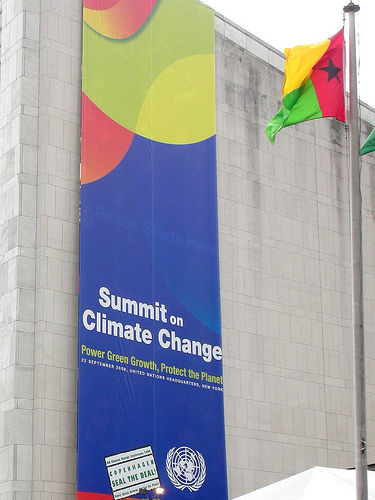
Oliver Lough is a research intern at the New America Foundation.
Seeing Barack Obama and Hu Jintao deliver their respective climate change spiels at New York yesterday was a bit like watching a couple of boxers circle each other warily at the beginning of a long bout. With the make-or-break summit at Copenhagen only 75 days away, this is not the most encouraging of sights.
Delivering a solid but not spectacular speech, Obama was always going to be constrained on what he could bring to the table by the fact that Senate deliberations on America’s own bill to reduce its emissions are woefully behind schedule, delayed by wrangling over healthcare and, farcically, by Sen. Kerry’s hip operation.
Still, the man is clearly doing his best. Sensibly, the President seems to have elected to cut his losses on charming his rather stone-faced audience, and focused instead on trying to bring wavering domestic support into line. While his assertions on how American families and businesses stand to benefit from a low-carbon economy may have struck a slightly odd note in a room filled with international heads of state, these are definitely the groups he needs to be buttering up if he wants to avoid the Waxman-Markey bill being flayed by the Senate.
But at least we weren’t expecting that much of him. By comparison, Hu’s widely anticipated speech was a spectacularly unimpressive misfire. Pulling back from outlining any concrete numbers on China’s emissions targets (as Reuters had hinted he might), the best he could come up with was a ‘notable’ reduction in carbon intensity by 2015.
His commitment to up the share of renewables in China’s energy mix is already common knowledge, while the millions and billions of hectares of new forests he pledged were a prime example of the typical Chinese strategy of hurling meaningless figures about the place in an attempt to impress.
Keith Johnson at the Wall Street Journal‘s environmental capital blog has been grumbling over the UN’s apparent decision to re-cast China as the good guy in all this. While Johnson’s panda-thumping here is a little one-sided, it’s hard to disagree with him on this particular point: although Hu’s speech is certainly a sign that China is starting to take these negotiations seriously, it was hardly the “very important statement and commitment” that Ban Ki moon hailed it to be.
In the midst of all of this equivocation, the modest, humorous address by Maldivian president Mohamed Nasheed was by far and away the highlight of the morning. Hamming it up to great effect, Nasheed (who is by now rather good at this kind of thing) began by apologizing for his presence on the stand. “The Maldives has developed something of a habit,” he blushed. “[every time we stand here] we warn you that our homeland will disappear beneath the rising see…even though deep down, we know you’re not really listening.”
Unfortunately for the Maldives, it seems like this morning has been a predictable case of business as usual.
— Oliver Lough


5 comments on “Guest Post by Oliver Lough: Business As Usual on Climate Change”